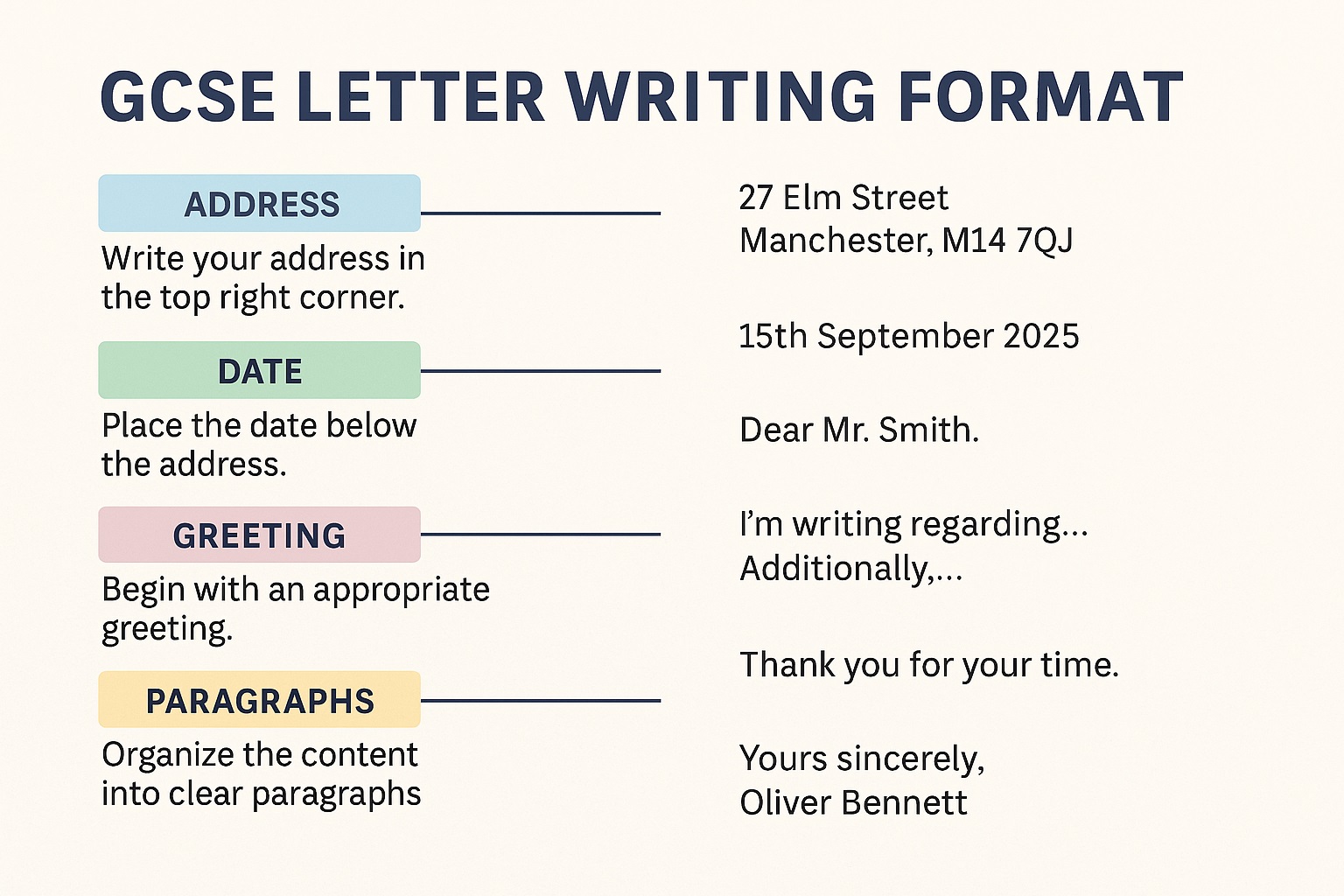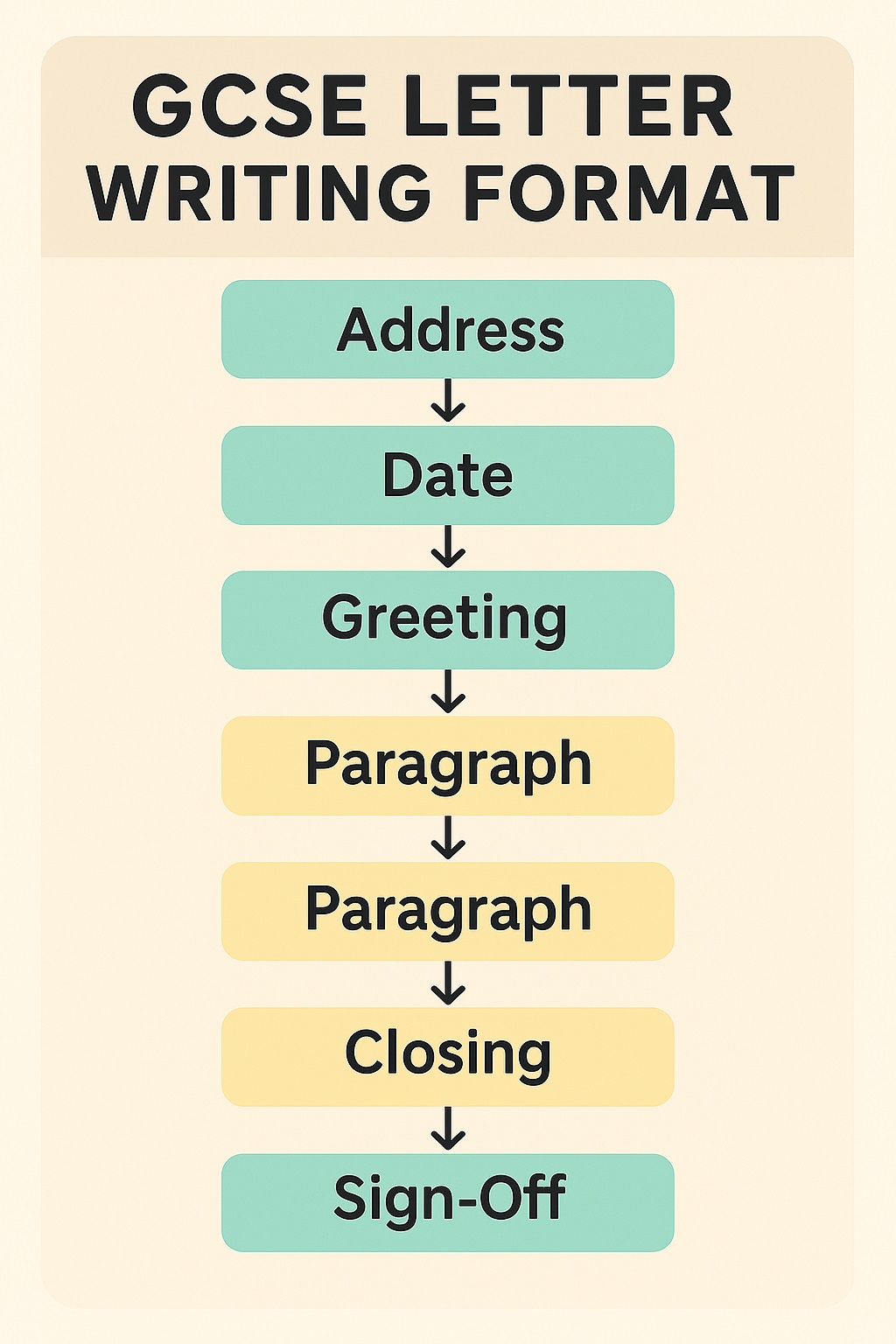Letter writing shows your ability to communicate clearly, logically, and appropriately, skills that aren’t just useful for exams, but for life. Whether it’s writing to a local council, a business, or even a family member, knowing how to shape your words is a core part of GCSE success.
In this guide, we’ll go step by step through everything you need to master: structure, format, examples, and those little details examiners love (and hate). By the end, you’ll feel confident enough to tackle any letter writing question that pops up in GCSE English Language Paper 2.
Why Letter Writing Is Important in GCSE English
The GCSE examiners include letter writing tasks because it tests a wide range of skills in one go. When you write a letter, you’re showing that you can:
Adapt your tone (formal, informal, or semi-formal)
Organise ideas logically into paragraphs
Use correct spelling, punctuation, and grammar
Stick to the purpose of the question (persuade, inform, argue, complain, or request)
Think of it this way: a letter is a mini essay dressed up with an address and sign-off. If you can nail letters, you’ll also improve your essay writing, article writing, and even speech writing.
Letter Writing Formats You Need To Know
Examiners usually give you a prompt that makes the purpose clear. From that, you’ll know which type of letter they’re expecting:
1. Formal Letters
These are to people you don’t know personally , companies, headteachers, councillors, MPs, organisations.
Use polite, professional tone
Avoid slang or contractions (“I am” instead of “I’m”)
Stick to clear, factual paragraphs
2. Informal Letters
These are to friends, cousins, siblings, or someone close to you.
Conversational tone
Use contractions and relaxed language
Can include humour or personal touches
3. Semi-Formal Letters
Somewhere in between , for example, a letter to a teacher you know well, or to a neighbour.
Respectful but slightly relaxed
Balance between warmth and formality
Tip: Always check the exam question carefully. If it says “Write a letter to your local MP” , that’s formal. If it says “Write a letter to your friend explaining what you think about…”, that’s informal.
How To Structure A Letter in GCSE
Here’s the golden rule: structure counts. Even if your language is brilliant, messy layout can cost marks. Follow this structure and you’ll be safe every time:
The Address and Date (Top Right or Left)
For formal letters:
Your address goes in the top right-hand corner, with the date below. If you need to include the recipient’s address (e.g., company), that goes on the left.For informal letters:
Just your address and date in the top right is enough.
Example (formal):
27 Elm Street
Manchester
M14 7QJ
15th September 2025
Greeting/Salutation
Formal letters: “Dear Sir/Madam” (if you don’t know their name), or “Dear Mr Smith” (if you do).
Informal letters: “Dear Alex,” or even just “Hi Sam,”
The Introduction (Purpose of the Letter)
This is your chance to set the tone. Don’t waffle. State why you’re writing.
Formal: “I am writing to express my concern regarding the lack of recycling facilities in our area.”
Informal: “I just had to tell you about what happened at school last week…”
The Main Body (Clarity and Paragraphing)
Split your points into neat paragraphs. Each one should have a clear focus.
Example for a persuasive letter:
Paragraph 1: Explain the issue
Paragraph 2: Give evidence or examples
Paragraph 3: Suggest a solution or make a request
For informal:
Paragraph 1: Background
Paragraph 2: Main story or experience
Paragraph 3: How you felt about it
The Closing Paragraph
Don’t just stop suddenly. Wrap things up:
Formal: “I hope you will give this matter your serious consideration.”
Informal: “Can’t wait to see you next weekend!”
The Sign-Off
Here’s where students often slip up. Use the right ending:
Yours faithfully , when you don’t know the name (after “Dear Sir/Madam”).
Yours sincerely , when you do know the name (after “Dear Mr Brown”).
Best wishes / Yours truly / Lots of love , informal letters.
How To Write A Letter for GCSE English Language Paper 2
Paper 2 is all about non-fiction writing. When they ask for a letter, you need to:
Read the task carefully – Is it asking you to argue, persuade, advise, or inform?
Plan quickly – Spend 2–3 minutes noting down key points and paragraph order.
Manage your time – Aim for 25–30 minutes writing, with 2–3 minutes for checking.
Match tone to audience – Don’t make a letter to a headteacher sound like a WhatsApp chat.
Use persuasive techniques if needed – rhetorical questions, facts, statistics, emotive language.
Common Mistakes To Avoid in GCSE Letter Writing
Mixing up Yours sincerely and Yours faithfully
Writing too much background before getting to the point
Forgetting the address and date
Using slang in formal letters (“gonna,” “wanna”)
Running paragraphs together instead of separating ideas
Overly dramatic openings (“It is with the utmost displeasure…”) , keep it natural
Quick Checklist Before Submitting Your Letter
Did I include address and date correctly?
Did I greet the person appropriately (Dear Sir/Madam vs Dear Sam)?
Did I explain the purpose of the letter in the opening lines?
Did I use separate paragraphs for separate points?
Did I finish with a proper closing and sign-off?
Did I check spelling, grammar, and punctuation?
Example Letters for GCSE Practice
Formal Letter Example
Task: Write a letter to your local council complaining about the closure of a public library.
27 Elm Street
Manchester
M14 7QJ
15th September 2025
The Local Council
Manchester City Council
Town Hall
Manchester
Dear Sir/Madam,
I am writing to express my concern regarding the recent closure of Moss Side Public Library. As a student preparing for my GCSEs, the library has been an essential resource for my studies. Without it, many young people in our community have lost a safe and quiet place to learn.
Not only did the library provide access to books, but it also offered free computer facilities, which many families cannot afford at home. Closing it will widen the educational gap in our city.
I strongly urge the council to reconsider this decision and to explore alternative funding options. The library has always been more than a building; it is a vital part of our community.
Yours faithfully,
Oliver Bennett
Informal Letter Example
Task: Write a letter to your friend describing your first day at a new school.
27 Elm Street
Manchester
M14 7QJ
15th September 2025
Dear Jake,
I can’t wait to tell you about my first day at the new school! It was nerve-racking at first, but by lunchtime I’d already made a couple of new mates.
The teachers seem strict but fair, and the science lab is massive compared to our old one. The best part? They’ve got a football pitch that’s almost as good as the city stadium. You’d love it here.
Of course, it’s not all perfect. I managed to get lost three times between classes , but at least it gave me a chance to talk to people while asking for directions!
Anyway, can’t wait to catch up with you properly this weekend. Wish you could’ve been there to see me wandering around like a lost puppy.
Best wishes,
Sam
Final Thoughts
Mastering letter writing for GCSE is less about memorising fancy words and more about getting the basics right , tone, structure, and purpose. If you remember to plan, stay relevant, and match your style to the audience, you’ll scoop up easy marks in Paper 2.
Want to sharpen your writing even more? Tools like Spinbot can help you reword, practice, and refine your sentences so you’re always exam-ready.

Oliver Bennett, with his Master’s degree from Manchester Metropolitan, is our in-house SEO specialist. At Spinbot UK Blog, he focuses on optimizing content to achieve the highest search engine rankings and edits articles to ensure they meet the highest standards of clarity and precision.

